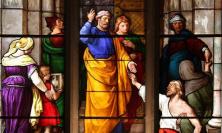
With the beginning of the 2012 Olympic Games now just days away, anticipation is at its peak in London and throughout the UK. Nicholas King SJ says that this Olympic fever, with its positive and negative aspects, would have been very familiar to St Paul, who was prone to using sporting metaphors. Where and why did Paul use athletic imagery in his letters, and how might he have encouraged us to react to the celebrations surrounding the ‘greatest show on earth’?
Everywhere you look just now in the United Kingdom, but especially in London, there is an awareness of the imminence of the Olympic Games. Some people greet it with weary cynicism (‘I’m getting out of London until it is all over’), but the general sense is that most people are waiting for it with an impressive degree of enthusiasm. Paul would have known of the Olympic Games, which took place every four years at the centre of Greece; but he would have been even more closely in touch with the Isthmian Games. This event took place every other year, and was second in importance only to the Olympics; and it happened very close indeed to his beloved Corinth. So Paul would have recognised much of the feverish atmosphere that surrounds this year’s event: the preparations of the capital city, the training of the athletes, the political and economic implications for the city hosting this money-spinner, the fact that there was a truce during the period of the games; he would also have recognised the clogged city-streets, the bragging-rights on offer if ‘my country gets more medals than your country’, the scandal surrounding cheating and the bribing of officials, and all the other negative features of sport in our day. Unlike his beloved Jesus, Paul was a town boy, and towns are where athletic competitions have to take place. So it was part of the world in which he grew up.
Can we glean anything from his writings about what his attitude might have been to the Olympics? Paul’s letters are rich in metaphor to describe what God has done in Christ, and he takes his metaphors from farming, the kitchen, the laundry, the law-courts and a thousand other areas of ordinary life. So it is no surprise that he draws on sports as a source for his images. The question for us is to what extent it was a part of him. Is he like the old lady who said ‘Oh yes – I know all about cricket: you throw the ball and then you run’? Or is he one of those tedious preachers (I have done it myself, often enough) who endeavour to keep the attention of the young by making reference to Manchester United’s performance yesterday, or the finely balanced state of things in the Test Match? Or does he know what he is talking about?
So here are a few of the places in his letters where Paul goes in for sporting metaphors; it is not a complete list, and you might enjoy reading through Paul’s letters and seeing what else you can find. One word to look out for is ‘crown’. This word (stephanos in Greek) has a variety of meanings, but one of them is the prize won by athletes in the games; you might think of a medal, or even, where the context is right, the ‘gold medal’. In the first letter to the Thessalonians, which is almost certainly the earliest surviving epistle of Paul, he uses the metaphor, almost unconsciously, at 2:19, when he describes the Thessalonian Christians as ‘a gold medal to boast about’.
When he comes to the Galatians, with whom he is rather cross, a sporting metaphor comes easily to his lips (he is dictating, of course, rather than writing) as he reproaches them for having lost their initial enthusiasm: ‘you were running nicely’, he complains (5:7), though then he spoils it all by lapsing into a perfectly horrid image, having nothing to do with sport.[1]
A big city like Corinth is an obvious place in which to use sporting metaphors; we have already mentioned the Isthmian Games, just down the road, and if Luke is correct in classifying Paul’s trade (along with that of Priscilla and Aquila) as ‘tent-making’ (Acts 18:3), then Paul will perhaps have had to work at constructing tents for the Athletes’ Village for the Games (athletes in those days had to put up with greater discomfort than their modern descendants) and so will have known all about it. In so determinedly secular a city as Corinth, sporting discourse will have found ready echoes, and it is not surprising that in his first letter to that rather awkward group of Christians, Paul develops his longest sporting metaphor (1 Corinthians 9:24-27):
Don’t you realise that the runners in the Stadium, all of them run, but only one gets the medal? You are to run in such a way as to win. Everyone who is in athletic training exercises self-control (but they do it to win a medal that will fade away...!); so I am running in such a way as not to be without purpose. When I box, I do it in such a way as not to land my blows on empty air – instead I let my body know who is boss, and I make it my slave...
The point here is that the Corinthians must be serious about their mission, as serious as athletes are about their training (and as Paul is about his preaching).
The Letter to the Philippians is written from a Roman prison and is, oddly enough, by some way Paul’s most joyful letter. One problem that he has to deal with is that some of his Christians, up there in Philippi, have been fighting. To counter this regrettable tendency, he once again uses a metaphor from athletics. Look at Philippians 1:27-30: Paul wants them to be ‘working together’. The Greek word for ‘working together’ here is really difficult to translate, because it means something like ‘playing on the same side together in an athletics contest’, which of course cannot possibly be expressed quite like that in English. He uses that metaphor again, incidentally, at 4:3, when he is trying to persuade the two redoubtable ladies, Evodia and Syntyche, to stop scratching each other’s eyes out. He says of them, ‘They played on the same team as me and Clement, and the rest of our team’. In chapter 2, however, the message is addressed to the entire group of Christians in Philippi, and he goes on to say (verse 28), ‘Don’t be intimidated by your opponents’, which has been the despairing mantra of every coach up against a team of monsters (I have used it myself, often enough, to a rugby team up against a better and bigger side). And in verse 30 Paul says, ‘ We are engaged on the same agon’. Now an ‘agon’ refers to any kind of athletics contest and an ‘agony’ is what you go through when you are in deep training for the Olympics. We may imagine the Philippians responding intelligently to this cricketing allusion. There are quite a few such sporting references in Philippians: 2:16-17 (where once again he is trying to cope with their divisions) has Paul talking again in athletic terms of ‘my boast...that I did not run a pointless race, nor was all my hard training pointless’, and he is happy to have been through it all for the sake of the Philippians and their joy (see 2:17-18).
Then in chapter 3:12-14 he tries another sporting metaphor (obviously he thought that up there in Philippi they turned first to the back pages), encouraging them to keep going in the race towards Christ that Paul is himself running: ‘I haven’t yet got it, nor have I already peaked [in my training] ... stretching out for what is ahead ... rushing towards the finishing-line [actually Paul uses the word for a “target”; you may wonder if his grasp of athletics has slipped at this point], towards the “prize” [and this word could also be translated as “the referee’s stand” or ‘the umpire’s dressing-room’: perhaps he is thinking of disputing their decision?].’
The Second Letter to Timothy may or may not have been written by Paul, but in the view of at least some scholars the chances are that it comes from his dictation; and in this letter he opts twice for a sporting metaphor. So at 2:5 he says, ‘If someone enters the Games, they don’t win the medal unless they compete in accordance with the rules’ (and we shall certainly have cause to reflect on that notion during the 2012 Games), as part of a series of metaphors, all aimed at encouraging Timothy to keep going. Then at 4:7 of the same letter, he has the well-known metaphor which can reasonably be translated, ‘I have competed in the best Games [agon again]; I have finished the Marathon’, and then comes a phrase that could mean ‘I have kept the faith’, but may also mean ‘I have kept the pledge’, which could be something like the numbers runners wear on their shirts (or, nowadays, the electronic chip in their shoes) to prevent any cheating, such as one runner pretending to be another, or taking a short cut.
Lastly, if Paul really knew about sports and was keen on them, you might expect him to make some reference in the Letter to the Romans, in many ways his most influential letter, but it was perhaps altogether too sensitive a business for him to go in for ‘frivolities’ in that epistle; he hardly knew the Roman Church, and really needed to win them over, because they had heard sinister reports of him. However, there is perhaps just one sporting metaphor in the Letter, which may strike a chord during the forthcoming Games. He is talking about his beloved fellow-Jews and their place in God’s plan, and at Romans 11:11, he says, ‘What I mean is this: don’t think that they stumbled in order to fall. No way – but when they tripped, it meant victory for the non-Jews, so as to encourage them. But if their tripping-over meant riches for the rest of the world, and their defeat meant riches for the non-Jews, how much more [would this be true of] their coming into full training’ (the translation here is a bit free, but defensible!).
So what has all this to say to us? Perhaps there is one temptation that all of us might avoid, and perhaps there are three acts of generosity that we might embrace. What we must all refuse is the weary cynicism that affects to find the whole thing a crashing bore, not worthy of serious attention. In place of that tired indifference, first, let us welcome the beauty of the London 2012 Olympic Games as a reflection of the beauty of God who is, as Paul said, ‘all in all’. Secondly, let us allow the athletes to point, even if unconsciously, to the One who made them. Thirdly, those of us in London and further afield can make our welcome to visitors an example of the ancient Christian virtue of hospitality. Paul would certainly approve.
Nicholas King SJ is a tutor in Biblical Studies at Campion Hall, University of Oxford.
[1] ‘You were running nicely; who impeded you, so as not to obey the truth? That persuasion does not come from the One who called you. A little leaven leavens all the dough. I am confident in you in the Lord, that you will not think any differently: whoever he is, the one who is unsettling you will carry the blame. As for me, brothers and sisters, if I proclaim that circumcision still matters, why am I being persecuted? So the scandal of the Cross us eradicated. I wish that those who are disturbing you would castrate themselves.’ (Galatians 5: 7-12, this and all translations taken from The New Testament, trans. Nicholas King [Kevin Mayhew, 2004])





